
A WEMBLEY A DAY
Regular visitors to Salut! Sunderland will know that our star contributor, the tireless Pete Sixsmith, has for the past two seasons been producing a twin series of articles entitled ‘The First Time Ever’ in which he recalls the first ever time he went along to the home grounds of the teams we are about to visit or in the case of home games, the first ever times he can remember seeing those teams on Wearside.
In the run up to next Sunday’s Checkatrade Trophy Final at Wembley, he recalls some previous occasions when he has been to the National Stadium. They won’t all involve Sunderland AFC but there will be one every day this week and we start today with his first ever trip to see the Twin Towers and it wasn’t (as the Americans might say) for a soccer match.
NUMBER 1 WAKEFIELD TRINITY v HUDDERSFIELD
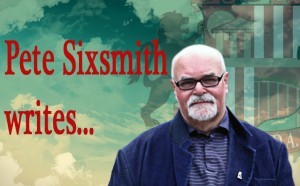
My first visit to what was then the Twin Towers was on May 12th 1962 for the Rugby League Challenge Cup Final between Huddersfield and Wakefield Trinity. This was the “original” Wembley that had been built for the Empire Exhibition of1923 and which had hosted FA Cup Finals since that date and Rugby League Cup Finals since 1929.
The stadium was the third largest in the UK and had a capacity of 100,000. Hampden could comfortably take 110,000 and Bradford Northern’s Odsal Stadium had squeezed in 102,000 for the 1954 replay between Halifax and Warrington There were two uncovered ends, and two curved stands that ran along each touchline. The white Twin Towers dominated one side of the stadium and the arches around were reminiscent of the Colosseum in Rome.
Why the Rugby League Cup Final? And why this one?
I was 11 when I went to this match, newly arrived in County Durham and making the switch from the 13-a-side game to the 11-a-side. I swapped Leeds for Shildon, a back to back with shared toilet for a semi with a bathroom and garden and Headingley for Dean Street.
As with all in-comers, it was difficult settling in and it was football that was the key. I realised that the only rugby in the area was the 15-a-side game and even at the tender age of 11, I knew that it was a game mired in obscure rules and played by posh boys who worked in the city or ran estates for their parents. Rugby League was (and still is) a game with deep roots in the industrial north and particularly in West Yorkshire and East Lancashire.
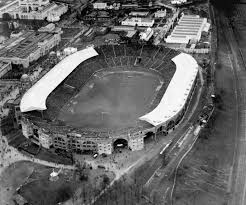
So, when my mam’s brother, Ken, asked me if I would like to accompany him to the 1962 Challenge Cup Final at Wembley, I badgered my parents to let me go. It meant a day off school which nowadays would incur a fine, but I was sure that Mr Owens, the Fourth Year teacher would not mind despite the looming 11+ exams. I wasn’t so sure about the fearsome Miss Jones, the fire breathing headmistress but I had gained some credit with her by being a reliable and industrious key monitor at the start of the day and at the end.
I took the train from Darlington to Leeds and Ken met me at the station. We went back to his house on the Middleton Estate and he showed me the tickets which he had got from Ken Hirst, the Trinity winger, who he worked with in a factory on Dewsbury Road. They were standing tickets, behind the posts and cost 3/6d for him and 1/9d for me.
The midnight train was taken from Leeds Central, calling at Wakefield Westgate, where Trinity fans by the score poured aboard, fortified by copious amounts of Tetley’s and Bentley’s ales and the train rattled through the night, arriving at Kings Cross at 5am.
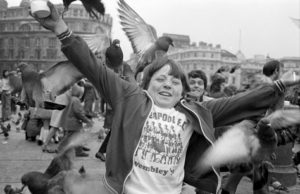
There are aspects of the day that I remember very clearly. Somewhere, there is a photograph of an overweight 11-year-old, clad in short trousers, gaberdine mac with a Wakefield bow tie attached to it and Tuf shoes, with an equally overweight Trafalgar Square pigeon sat on his head. The pigeon looks hungry, the boy looks a tad worried.
Sights were taken in. Piccadilly Circus, the Houses of Parliament, Buckingham Palace, the Purple Pussy Cat Club and then we got the tube to Wembley.
The Twin Towers were spotted early and the sense of excitement rose as we got closer and we walked up the Empire Way, passing The Empire Pool and onto the Empire Stadium. Nowadays you sense that it is the kind of place that Jacob Rees-Mogg and his little chums would love. Maybe they will rename it.
The programme for the pre-match entertainment was the Massed Bands Of The Grenadier Guards who played a selection of popular melodies, culminating in the tune known as Out of The Blue by Hubert Bath (not to be confused with the great Harry Bath, the Australian second row forward who played over 300 games for Warrington) and which is better known as the theme music for Sports Report. The ghosts of Eamonn Andrews, Peter Jones, Des Lynam etc come tumbling over the airwaves……
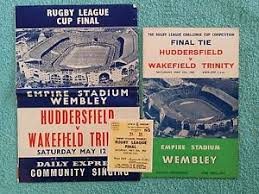
After that, up stepped Arthur Caiger in his white suit. He mounted a podium and encouraged us to wave our Daily Express Songsheets as we joined in a series of popular ditties. Seeing as it was an all Yorkshire final, he would have had us warbling My Girl’s a Yorkshire Girl, Eeeh Bah Gum She’s A Champion and several verses of On Ilkley Moor Baht’At – but not the bit about “then we shall all have aten thee’.
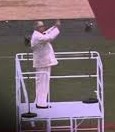
The teams were presented to the visiting dignitary, in this case Field Marshal Earl Alexander of Tunis, the Grenadier Guards played the National Anthem which we sung with gusto and the game started.
The crowd was not segregated. Trinity supporters stood next to those wearing Huddersfield colours without any acrimony; indeed, rugby league is still a game where the fans mingle, particularly at the levels below Super League.
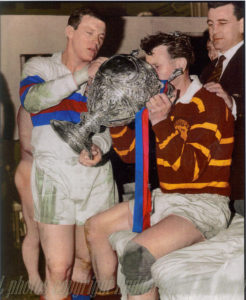
The game ended in a 12-6 win for Trinity. Ken Hirst scored an excellent try, Neil Fox – probably the finest British player I have ever seen – also got one and dropped three goals, while the excellent Tommy Smales and the dependable Peter Ramsden scored tries for Huddersfield. Neil Fox won the Lance Todd Trophy for the player of the match and Derek “Rocky” Turner, one of the hardest players in the history of the game, stepped up to receive the cup from Earl Alexander.
The evening was spent in London. I vaguely remember eating at a Lyons Corner House or an ABC Café before we caught the train back to Leeds and I returned to Shildon full of tales about Wembley, Neil Fox, Tommy Smales and obese pigeons.
Not for the first time in my life, I found that nobody was interested……….
And finally, a brief look at what else was going on in May 1962. Harold Macmillan was Prime Minister but declined to attend the Challenge Cup Final as he was a regular behind the sticks at Wheldon Road, Castleford and he couldn’t stand either of the two protagonists. I believe he said: “I’d rather listen to a speech from Selwyn Lloyd than watch either of those two wazzocks.”
In Association Football (remember, an alien game to this 11-year-old), Ipswich Town managed by Alf Ramsey won the First Division title and Tottenham Hotspur had retained the FA Challenge Cup by overcoming Burnley 3-1 the week before my visit. For all concerned, Tractor Boys, Spurs or Trinity fans, it really was a Wonderful Land – which coincidentally was the No 1 record by The Shadows. It was enjoying its third week at the top with another five to go.
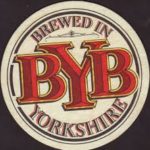
Those who did not make it to the Final could watch it on the BBC. David Coleman introduced Grandstand and Eddie (“Aye, he’s a big lad”) Waring commentated on it. He knew his rugby league did Eddie and he carefully explained the game to all those who, mistakenly, did not follow it.
After Grandstand, the BBC excelled itself. Mr Pastry’s Progress – The Trainspotters Club was followed by David Jacobs and Juke Box Jury with the jury consisting of three up to date and with-it hep cats in Jean Metcalfe from Two Way Family Favourites (“What’s the weather like in Cologne, Bill”), Harry Rabinowitz, the musical director of BBC Light Entertainment and part time beatnik, and Leila Williams, the original Blue Peter girl. It was she who put up with Christopher Trace playing with his train set and taught us how to make box girder bridges and cure all known diseases.
On we went to The Billy Cotton Band Show with Billy, Alan Breeze (speciality The Donkey Serenade) and Kathy Kay with Cliff and The Shadows as special guests. No doubt they played Wonderful Land to celebrate Trinity’s win. The other guest was Mrs Mills who no doubt hit the odd right note in her spot.
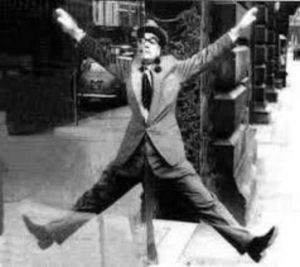
The highlight of the evening – it wouldn’t have to be very good – was Here’s Harry starring former Barnsley miner, Harry Worth, who lived with his Auntie in Acacia Avenue and bumbled his way through life while looking for shop mirrors to cavort in front of.
For Sunderland supporters feeling frustrated at missing out on promotion by one place, they could console themselves with a pint of Vaux’s Samson for 1/6d. That would be about 15 pints for a pound which sounds great but seeing as the average wage was £16.50 it’s not as good as it sounds.
But at least they didn’t have to worry about Brexit…….
